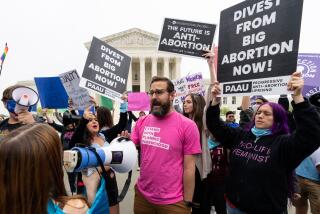Supreme Court weighs whether pregnant workers can claim lighter duties
Since the 1970s, employers have been warned not to discriminate against pregnant employees, who “shall be treated the same” as other workers, according to a 1978 law.
But as a Supreme Court argument revealed Wednesday, it is still not exactly clear what Congress meant.
Some say it meant that employers should give pregnant women special treatment, such as lighter duty or shorter hours, if they need such accommodation.
Or did it mean that pregnant women may be temporarily laid off, just like a worker who twists an ankle or injures a back, and is unable to do the heavy lifting required by the job?
In a surprising set of exchanges, the justices said they thought the law could be read in two ways.
It could require “favored” treatment for pregnant employees, but not necessarily, Justice Antonin Scalia said as the argument began.
If there was one point of agreement Wednesday, it was that employers may not treat pregnant women worse than other workers who have a temporary disability.
At issue before the court was a decision by United Parcel Service to lay off Peggy Young, a delivery truck driver, after she became pregnant in 2006. She was urged by a medical advisor not to lift more than 20 pounds during her pregnancy, and her job sometimes required her to lift packages as heavy as 70 pounds.
So she asked a supervisor to be assigned to lighter duty for a time. Instead, she was laid off. UPS said it would give lighter duty to employees who were injured on the job, but not to workers who suffered other injuries or a temporary disability. The company made no special allowance for pregnancies.
Young sued, but lost before a federal judge and a U.S. appeals court. Both said UPS did not discriminate against her because of her pregnancy, but instead treated her the same as others who could not carry out their duties -- just as the 1978 law required.
UPS has since changed its policy to accommodate pregnant women. But New York attorney Caitlin Halligan on Wednesday defended the company’s previous stance as legal. Federal law does not require “preferential treatment” for pregnant employees, she told the court.
Justice Ruth Bader Ginsburg objected and said UPS appeared to be giving pregnant employees “least favored” status. She cited reports that some men who had work injuries were given lighter duty.
Halligan denied that claim and said workers who were injured outside the job did not get special accommodations.
University of Michigan law professor Samuel Bagenstos said Young and other pregnant workers were “entitled to the same accommodation” given other employees who had temporary disabilities.
U.S. Solicitor Gen. Donald Verrilli Jr. argued that Young deserved to win if there was evidence that other UPS workers were given lighter duty for a time. The law makes clear that pregnant employees “can not be treated worse” than others based on their condition, he said.
On Twitter: @DavidGSavage
More to Read
Sign up for Essential California
The most important California stories and recommendations in your inbox every morning.
You may occasionally receive promotional content from the Los Angeles Times.










